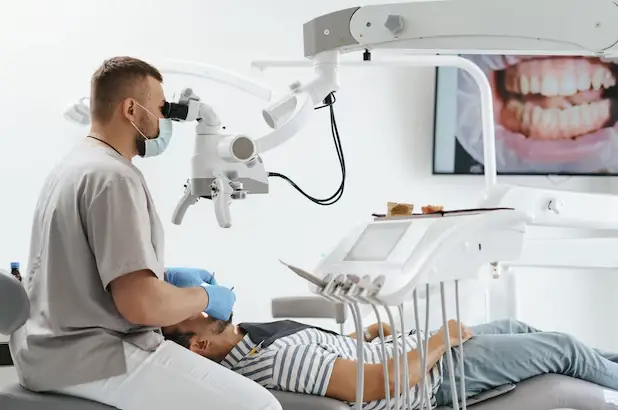Exploring the Science Behind Modern Dentistry

Modern dentistry combines advanced science and innovative technology to improve oral health and overall well-being. From precision diagnostics to minimally invasive treatments, dental care today offers solutions that are safer, faster, and more effective. Patients can make informed decisions about their oral health by understanding the science behind these advancements. Let’s explore these developments and how they benefit your smile.
Advanced Diagnostic Tools: Early Detection and Accuracy
Accurate diagnosis is the cornerstone of effective dental care. Thanks to cutting-edge tools, dentists can identify potential problems early, often before they cause discomfort or become serious.
Digital X-rays: These provide high-resolution images of teeth and surrounding structures while using up to 90% less radiation compared to traditional X-rays. They help detect hidden cavities, infections, and bone loss.
Cone-Beam Computed Tomography (CBCT): This 3D imaging technology offers a comprehensive view of the mouth, jaw, and sinuses. It is particularly useful for planning complex procedures such as dental implants, wisdom teeth extractions, and orthodontic treatments.
Intraoral Cameras: These small, pen-sized cameras capture detailed images of teeth and gums. They help dentists and patients see problem areas clearly, fostering better communication and understanding.
Practical Tip: During your next dental visit, ask about the diagnostic tools your dentist uses. High-tech imaging can make a significant difference in early detection and treatment planning.
Innovative Treatments in Modern Dentistry
Advances in dental science have revolutionized treatment options, offering patients less invasive, more comfortable, and faster solutions.
Laser Dentistry: Lasers are now used in a variety of procedures, from treating gum disease to reshaping soft tissue. They offer greater precision, reduced bleeding, and quicker healing times compared to traditional methods.
3D Printing: This technology allows dentists to create crowns, bridges, dentures, and orthodontic aligners in-house. The result is a quicker turnaround time and custom-fit appliances that enhance comfort and functionality.
Minimally Invasive Techniques: For instance, air abrasion technology can remove small areas of decay without the need for a traditional drill, making procedures less intimidating for patients.
Preventive Dentistry: The Science of Maintenance
Preventive care is one of the most effective ways to maintain oral health and reduce the need for extensive treatments. Modern research emphasizes the importance of oral microbiome health in preventing cavities, gum disease, and bad breath. By keeping a balanced ecosystem of bacteria in the mouth, you can avoid many common dental problems.
Fluoride Treatments: Strengthen enamel and protect against decay.
Sealants: Applied to the chewing surfaces of molars, these provide an extra layer of protection against cavities, especially for children.
Oral Hygiene Education: Dentists now emphasize tailored advice for patients, focusing on techniques and tools that suit individual needs.
Practical Tip: Drinking water throughout the day, especially after meals, helps wash away food particles and balances the pH levels in your mouth, reducing the risk of decay.
Personalized Dentistry: Tailored Solutions for Every Patient
Modern dentistry understands that each patient is unique, making personalization essential for optimal results.
Biocompatible Materials: Modern materials like tooth-colored fillings and zirconia crowns blend seamlessly with natural teeth, offering strength and beauty.
Custom Aligners: Clear aligners, like Invisalign, are tailored to each patient’s mouth for discreet and comfortable teeth straightening.
Cosmetic Dentistry: Services like teeth whitening, veneers, and smile makeovers are customized to enhance your individual features.
If you’re considering improving your smile, reach out to a dental practice serving Chesterfield to explore options like veneers, aligners, or whitening treatments that are customized to your needs.
Everyday Tips for Optimal Oral Health
While modern technology plays a significant role in dentistry, maintaining good oral health starts with daily habits. Incorporating science-backed practices into your routine can help keep your teeth and gums in great shape.
- Brush Properly: Brush your teeth twice a day using fluoride toothpaste and a soft-bristled brush. Be sure to brush your tongue as well to eliminate bacteria and freshen your breath.
- Floss Daily: This helps clean areas between teeth that brushing can’t reach, reducing the risk of cavities and gum disease.
- Rinse After Meals: If brushing isn’t an option, rinse your mouth with water to wash away food debris and neutralize acids.
- Eat for Your Teeth: Foods rich in calcium, vitamin D, and phosphorus, like dairy products, leafy greens, and fish, promote strong teeth and healthy gums.
- Regular Check-Ups: Seeing your dentist every six months ensures potential issues are caught early, saving you time, money, and discomfort.
Conclusion
The science behind modern dentistry has transformed the way oral care is delivered, making treatments more effective, less invasive, and highly personalized. By embracing these innovations and maintaining healthy habits, you can protect your smile for years to come.
